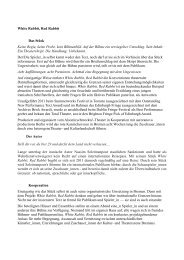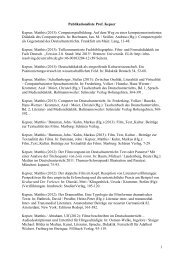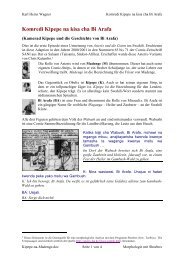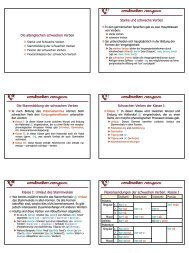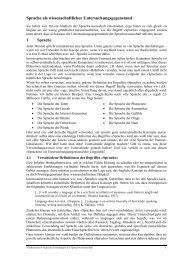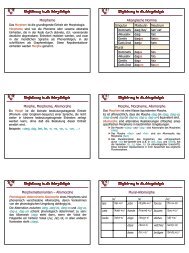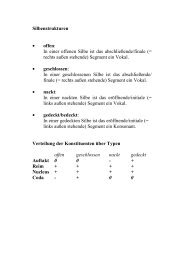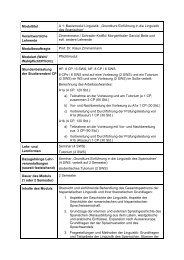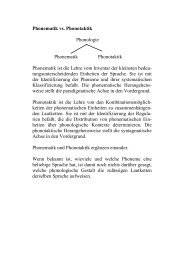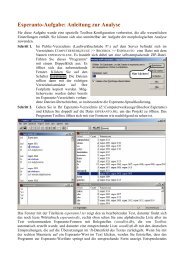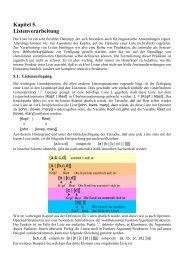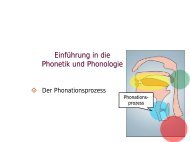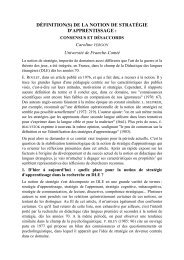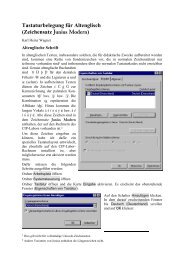Relativism and Universalism in Linguistics - Fachbereich 10 ...
Relativism and Universalism in Linguistics - Fachbereich 10 ...
Relativism and Universalism in Linguistics - Fachbereich 10 ...
Create successful ePaper yourself
Turn your PDF publications into a flip-book with our unique Google optimized e-Paper software.
Section G: Verbal Categories (aspect <strong>and</strong> sundry dist<strong>in</strong>ctions) 77<br />
of the situation stretch <strong>in</strong> TT, which is perceived as an external perspective on the eventuality.<br />
Topic Time is the pivot mediat<strong>in</strong>g between the time of speak<strong>in</strong>g <strong>and</strong> the time of the situation.<br />
Imperatives do not feature TT because a truth claim cannot be made about a situation whose<br />
realisation depends on the abilities of the addressee. Imperatives conta<strong>in</strong> a reference time span<br />
constra<strong>in</strong><strong>in</strong>g an obligation. This time span <strong>in</strong>cludes the time of speak<strong>in</strong>g because the<br />
obligation is valid at the moment the imperative is uttered. The use of a perfective verb<br />
emphasises the completeness of the requested situation because the resultant state is <strong>in</strong>cluded<br />
<strong>in</strong> the time stretch of obligation (OT).<br />
In Imperatives negation usually operates on the proposition, <strong>in</strong>fluenc<strong>in</strong>g the aspectual<br />
<strong>in</strong>terpretation. Perfective verbs express a change of state, focus<strong>in</strong>g the reference time on the<br />
resultant state. Negat<strong>in</strong>g the perfective aspect means to move the reference time back to the<br />
source state. The reference time becomes <strong>in</strong>cluded <strong>in</strong> the situation time, yield<strong>in</strong>g an<br />
imperfective <strong>in</strong>terpretation. Under negation we obta<strong>in</strong> a comb<strong>in</strong>ation of temporal values<br />
known as Present: time of speak<strong>in</strong>g <strong>and</strong> source state are <strong>in</strong>cluded <strong>in</strong> the reference time of the<br />
obligation. This causes a mismatch between the aspectual <strong>in</strong>terpretation of the imperative <strong>and</strong><br />
the perfectivity of the verbs.<br />
In Bulgarian, this type of aspectual coercion <strong>in</strong>duces secondary imperfectivisation. This overt<br />
morphological mark<strong>in</strong>g applies obligatory also <strong>in</strong> Preventives, a type of negative Imperatives<br />
<strong>in</strong> which other Slavic languages use perfective verbs. This phenomenon is rooted <strong>in</strong> the<br />
different functional range of perfective verbs. In contrast to Bulgarian, Slavic languages use<br />
perfective verbs to express Future, Historic present <strong>and</strong> habituality. The TAM system <strong>in</strong><br />
Bulgarian emphasises the imperfective side reach<strong>in</strong>g a state <strong>in</strong> which bare perfective<br />
verbs cannot express Tense <strong>in</strong> the ma<strong>in</strong> clause. Bulgarian perfectives are fully <strong>in</strong>tegrated <strong>in</strong>to<br />
the analytic Future, where Tense is borne by the future auxiliary. Historic present <strong>and</strong><br />
habituality are predom<strong>in</strong>antly <strong>in</strong> the doma<strong>in</strong> of imperfectivised verbs. The holistic mean<strong>in</strong>g<br />
of Bulgarian perfectives prevents them from express<strong>in</strong>g Present, as their TT never <strong>in</strong>cludes<br />
the time of speak<strong>in</strong>g. Only imperfectivised verbs ma<strong>in</strong>ta<strong>in</strong> such a relation to the time of<br />
speak<strong>in</strong>g, while <strong>in</strong>dicat<strong>in</strong>g the boundedness of the situation. The productivity <strong>and</strong><br />
transparency of imperfectivis<strong>in</strong>g suffixes support their spread with<strong>in</strong> the temporal doma<strong>in</strong>, a<br />
process <strong>in</strong>dicative of Bulgarian's strong analytic tendency. Given these typological<br />
peculiarities, the motivation for the aspectual coercion <strong>in</strong> negative Imperatives is<br />
straightforward.<br />
Kle<strong>in</strong>, W. (1994). Time <strong>in</strong> Language. London: Routledge.<br />
„X sitzt“ – aber wo und wie?<br />
Khizanishvili, Tamar<br />
Universität Bremen<br />
tamarkh@uni-bremen.de<br />
Nach allgeme<strong>in</strong>er Auffassung der Kartvelologen gibt es im Megrelischen ca. 90 Präverbien.<br />
Durch Präfigierung dieser Präverbien wird die Bedeutung der Grundverben semantisch<br />
modifiziert. Bei der direktionalen Differenzierung spielen die Präverbien im Megrelischen<br />
e<strong>in</strong>e große Rolle. Daneben können sie Zeit und Raum näher bestimmen. Manche der<br />
Präverbien können adverbial gebraucht werden. Z. B.:<br />
• eše ešelj. – „Er kam nach oben“.<br />
• gime gimelj. – „Er kam nach unten“.<br />
• mite mitilj. – „Er g<strong>in</strong>g h<strong>in</strong>e<strong>in</strong>“. usw.



